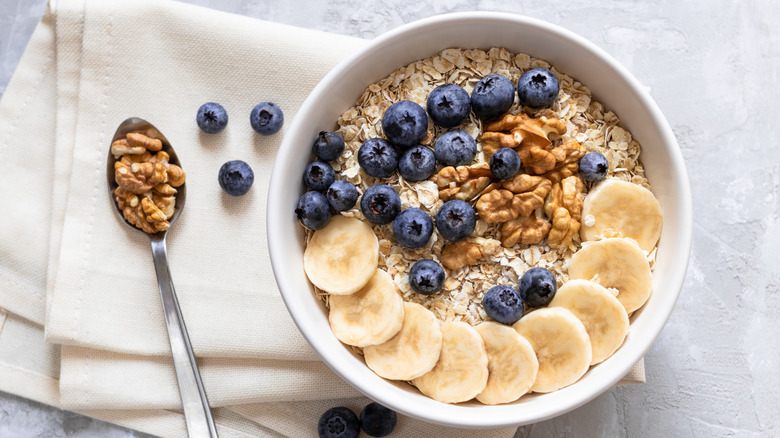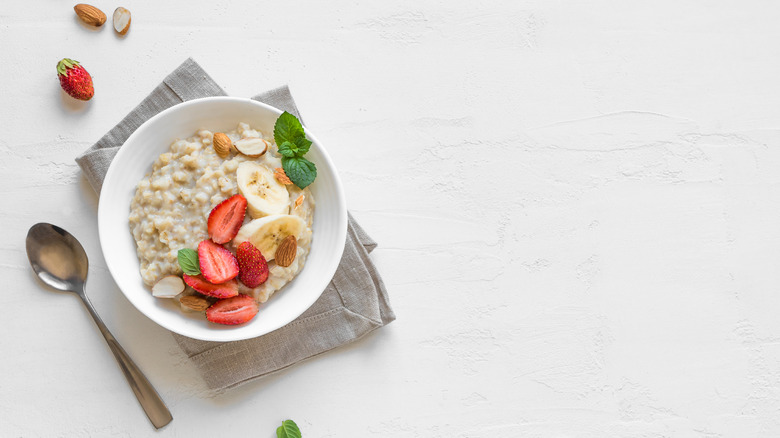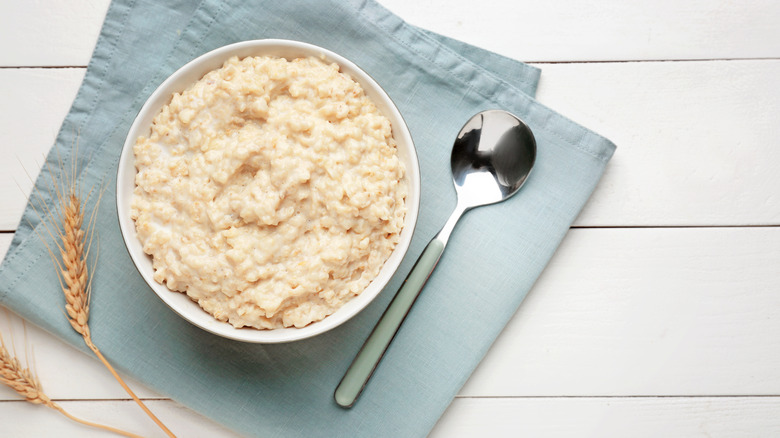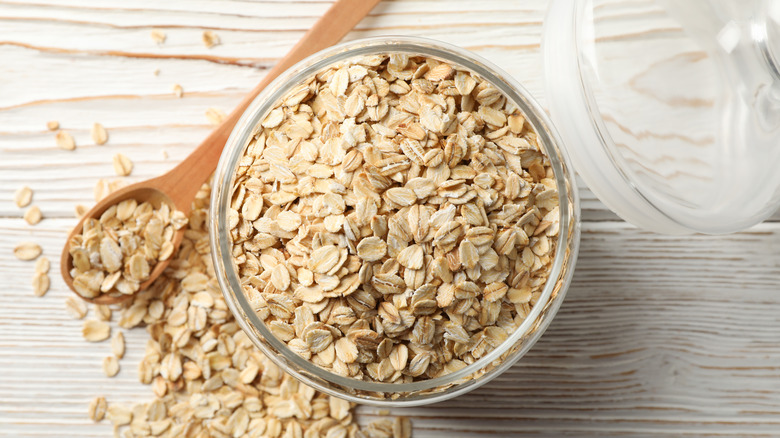When You Eat Oatmeal Every Day, This Is What Happens
People across the globe enjoy a nice bowl of oatmeal in the morning. Need proof? The world's oatmeal market was valued at $2.4 billion in 2019 and "is projected to reach $3.53 billion by the end of 2027," reports Fortune Business Insights.
Egypt and China have been enjoying oats for thousands of years, according to NPR affiliate station KRCU. America, meanwhile, was introduced to oatmeal relatively late in the game. Americans considered oats to be horse food until Quaker Oats came along in the late 1800s and successfully convinced people otherwise.
There are many reasons people choose oatmeal as their morning meal over animal-based options such as eggs and bacon. Some eat oatmeal out of convenience, some enjoy the taste, and many believe oatmeal is a healthy breakfast option. There are several convincing arguments for why you may want to integrate oatmeal into your daily routine, according to Everyday Health.
You'll benefit from important vitamins and minerals
Oatmeal provides a mix of vital nutrients, including magnesium, zinc, and iron. Magnesium is important for heart and brain health, while zinc aids the immune system, and iron boosts energy. Oatmeal is also a solid source of vitamin B6. Not getting enough of this nutrient could contribute to carpal tunnel syndrome, according to UCLA Health.
A half-cup serving of oatmeal has the same amount of protein as one large egg. And there are countless ways to increase the protein content of your oatmeal by adding nuts, protein powder, nut butters, or milk, suggests Nutritious Life. If you want an even bigger protein boost, try mixing an egg into your oatmeal.
Just finished a hard workout? Oatmeal is also one of the best foods to replenish your muscles and refuel your body, per Food Network.
You could improve your cholesterol levels and regulate your blood sugar
Has your doctor ever told you that your cholesterol is too high? According to the Cleveland Clinic, eating one and a half cups of oatmeal per day could lower your cholesterol by 5 to 8%. Furthermore, one study followed participants for 13 years, concluding that eating oatmeal instead of bread or eggs every day could lower the risk of stroke, per the American Heart Association.
And for diabetics (or anyone else wanting to avoid blood sugar spikes), oatmeal's soluble fiber helps slow the absorption of the carbohydrates, according to Diabetes Self-Management.
Additionally, oatmeal has a low glycemic index (the lower the GI number, the less likely the food you eat will cause a spike in blood sugar). However, the lower GI only applies to unflavored varieties of oats — not that yummy, processed, flavored, instant oatmeal that contains added sugar.
The fiber content could help with weight maintenance
Oatmeal contains a solid amount of soluble fiber, which is lacking in many American diets.
According to GQ, the average American barely eats half of the World Health Organization's recommended daily serving of 25 to 29 grams of fiber per day. But here's the good news: A cup of cooked oatmeal contains 4 grams of fiber. Adding another fiber-packed food, such as raspberries or blackberries, will boost the fiber content of your breakfast even further, per My Food Data.
The fiber in oatmeal helps you feel fuller faster — and longer — than fiber from other foods, too. A study published in the Journal of the American College of Nutrition in 2015 found that oatmeal "increases satiety and reduces energy intake" more than an "oat-based breakfast cereal." That feeling of fullness and satiety could help some people manage their weight, per Medical News Today.
It's all about the beta-glucan
As registered dietitian Kristen Carli, MS, RD, of the Phoenix-based Camelback Nutrition & Wellness explained to Mashed, the specific type of soluble fiber that oats contain is called beta-glucan. This type of fiber forms "a gel-like substance" when combined with liquid, and it can help improve your insulin response. Plus, beta-glucan "can lead to an increased feeling of fullness and may help reduce blood sugar," Carli says.
"One serving of rolled oats contains roughly one to two grams of beta-glucan," registered dietitian Sydney Greene, MS, RD, wrote for Eat This, Not That!. "Beta-glucan has been shown in research studies to be the active ingredient responsible for oatmeal's LDL cholesterol-lowering effects."
Whether you want to lower your cholesterol, improve IBS symptoms, or you just want a breakfast option that will keep you feeling full, eating oatmeal is a healthy, fiber-packed way to start your day.
You might experience gastrointestinal pain if you eat too much fiber
While adding more oatmeal to your diet is generally a net positive, there are side effects to increasing the amount of fiber you eat.
The FDA recommends eating around 28 grams of fiber per day. And, yes, many Americans don't eat enough fiber, per 2016 research published in the American Journal of Lifestyle Medicine. But eating too much fiber can lead to digestive issues, too.
"To avoid any discomfort from too much fiber, aim to increase your consumption of fiber-containing foods slowly so your body can work up to being able to process that much fiber," Kristen Carli, MS, RD, explained to Mashed. "Too much fiber increased too quickly can lead to bloating, gas, and constipation." When incorporating fiber into your diet, you don't want to go from 0 to 100 — you'll want to up your fiber consumption gradually.
How to eat more oatmeal
So, how do you go about integrating more oatmeal into your life? The first step is to choose an oat variety that suits your lifestyle, suggests Simply Oatmeal. (If you don't have the time to simmer oats on the stove before work, you probably won't incorporate oatmeal into your regular breakfast routine.)
Steel-cut oats, for instance, require around 25 to 30 minutes to cook. Old-fashioned oats, meanwhile, take five minutes on the stove. Quick oats cook in one minute, and instant oats can be microwaved in 90 seconds, per Good Housekeeping.
Still find the taste of oatmeal boring? There are plenty of ways to make oatmeal taste better. Get creative with spices, add a dollop of your favorite low-salt, low-sugar peanut butter, throw a fried egg on top, or add fresh fruit. The options are endless, and you'll be eating a different meal every time.






